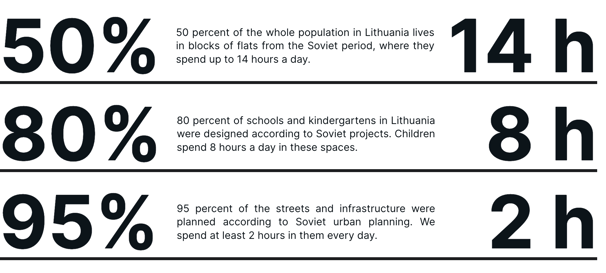SPATIAL PROPAGANDA RESEARCH


Spatial propaganda research tries to specify the spatial propaganda in everyday spaces: neighborhoods, streets, homes in Central and Eastern Europe. “We once learned and got used to the fact that there should be no love in a public environment.”- these are philosophical thoughts of G.T.Gylyte. More precisely, we have been accustomed to the fact that the entire public environment surrounding us and shared by us must be formal, official and impersonal. The formal and authoritative environment gradually brought out the formal and authoritative person in us, who began to look at the environment in an unsociable and no longer a homely manner. We have become estranged from not loving in a public environment, we have become demanding and waiting, instead of hosting ourselves.
Each space carries out some kind of spatial program. Each space is consciously or unconsciously programmed with some kind of intensity, value, message, mode of operation and, last but not least, function. People's communality, safety, unity, and likability can be programmed in space. In the same way, a space can be programmed to divide, separate people, promote lack of autonomy, sow anxiety, fear and insecurity. It became a working spatial propaganda, which was used to massively build houses, schools, kindergartens, streets, and cities throughout Central and Eastern Europe. We inherited what we didn't want, and then got used to it.
“It is a captivating idea that the built environment shapes society”- says Nial Ferguison, British-American historian, Milbank Family Senior Fellow at the Hoover Institution and a senior fellow at the Belfer Center for Science and International Affairs at Harvard University.
“Spatial propaganda is not named and not talked about much and yet it is one of most aggressive tools to bring anti-community and destroy a sense of belonging. This is dangerous because it set us apart. And unity is number one rule for maximum safety” - says Eugenijus Listauskas, Colonel, head of the board responsible for military training and exercises of the J7 Defense Staff of the Lithuanian Armed Forces
“These stampt architectural and urban principles stamps and materialise Russian Colonialism. CEE countries should act on that” - says Maksym Eristavi, journalist and author of bestselling book “Russian Colonialism 101”
Year: 2016 - ongoing
Location: CEE Europe
Type: Independent research
Status: On-going
Research lead: G.T. Gylyte
Team: Rebuild the Wonderful
Self Financed
